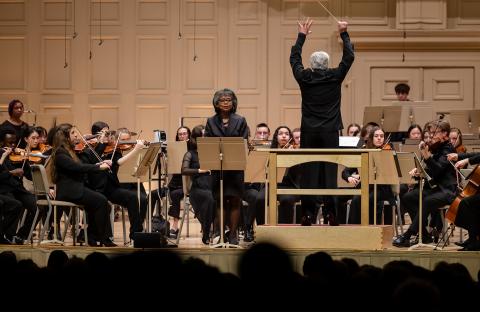Watch Anita Hill Perform with Boston Conservatory Orchestra at Symphony Hall

Anita Hill with Boston Conservatory Orchestra, conducted by Professor Bruce Hangen.
Liz Friar
As a scholar, attorney, civil rights activist, and trailblazing advocate for gender equality, Dr. Anita Hill has long been in the public consciousness as a powerful agent of social change.
On February 16, 2024, Hill brought her singular voice to a different kind of stage when she made her orchestral debut at Boston’s Symphony Hall with Boston Conservatory Orchestra in a special performance of Joseph Schwantner’s “New Morning for the World,” in which she recited the words of Dr. Martin Luther King Jr.
Presented as part of Boston Conservatory Orchestra’s Black History Month celebration, the performance gave Conservatory student musicians a rare opportunity to experience history while making it—sharing the stage with a deeply pivotal figure in a storied concert hall.
WATCH: Anita Hill joins Boston Conservatory Orchestra and Conductor Bruce Hangen in a performance of Joseph Schwantner’s “New Morning for the World.”
“The feeling that I want people to leave with is not that history is being read to them, but I want them to take into account the contemporary situation that we’re in … and to understand that these words are words that can help us think about how we are going to end inequality, how we are going to promote justice, and what it takes to get there.”
— Anita Hill
Premiering in 1983 at the Kennedy Center for the Performing Arts in Washington, D.C., “New Morning for the World” incorporates various excerpts from King’s speeches and writings, including “Letter from Birmingham Jail,” “Behind the Selma March,” and the “I Have a Dream” speech. At Symphony Hall, Hill joined the ranks of other prominent voices—including Maya Angelou, Coretta Scott King, and James Earl Jones—who have recited King’s words in previous performances of Shwantner’s piece.
In a conversation with GBH’s Jared Bowen ahead of the performance, Hill emphasized the strong resonance of King’s words with present-day struggles for equality: “The feeling that I want people to leave with is not that history is being read to them, but I want them to take into account the contemporary situation that we’re in … and to understand that these words are words that can help us think about how we are going to end inequality, how we are going to promote justice, and what it takes to get there.”
Learn more about Boston Conservatory's top-ranking music programs.
